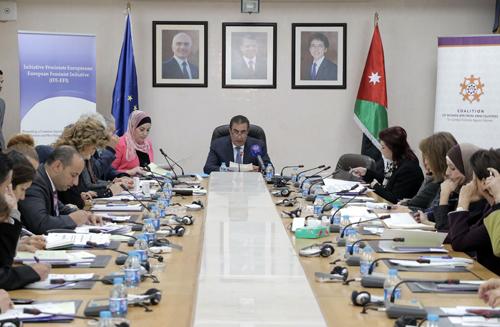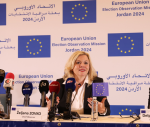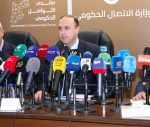You are here
Women groups urge setting up women parliamentarian committee for Mediterranean
By Rana Husseini - Apr 26,2017 - Last updated at Apr 26,2017
AMMAN — Women groups on Wednesday called for establishing a women’s parliamentarian committee to address the growing challenges women are facing in the Mediterranean area.
“We are witnessing a retreat in women’s rights in the region because of the conflicts in the area, and a women’s parliamentarian committee in the Mediterranean is important to safeguard their rights,” said Secretary General of the Jordanian People's Democratic Party Abla Abu Olbeh.
Abu Olbeh, a former MP, also said: “This should also be an early warning for European countries living in safe environments that the deterioration of women’s rights in the Mediterranean area could eventually affect their stability and security.”
Jerash Deputy Wafaa Bani Mustafa, also the head of the Jordanian Women Parliamentarian Forum, said: “Countries in the Mediterranean area need to work urgently on amending all the laws that discriminate against women, and draft practical practices to ensure their safety and security.”
“I believe it is important to form a women’s parliamentarian committee to follow up on all the laws that discriminate against women [in the Mediteranean region]. We have already begun the process in Jordan by calling for many amendments under the Dome,” Bani Mustafa added.
Abu Olbeh and Bani Mustafa’s remarks were made during a national roundtable titled “From ministerial conclusions to gender equality policymaking in the Euro-Med region”, organised by the Euro-Med Feminist Initiative (EFI).
The event, held at the Lower House, is one of seven roundtable discussions to take place in seven Arab countries, including Jordan.
It aims at gathering civil society organisations focused on women’s rights with relevant stakeholders and policymakers to discuss policy recommendations in the four identified priority areas.
The four areas include ending discrimination against women, reforming education, ending violence against women and ensuring the civil societies' freedom and independence.
Speaker of the Lower House Atef Tarawneh, who acted as the patron for the event, stressed that “there will be no sustainable development unless there is equality in rights and duties between men and women”.
“We, in Jordan, are constantly supporting women’s efforts to reach the best positions in an equal manner, and we are convinced that once women gain their equal rights, they will overpower men when it comes to devotion and accuracy at work,” Tarawneh told the gathering.
Minister of Political and Parliamentary Affairs Musa Maaytah said the government has taken many steps to empower women by introducing quotas in Parliament and municipalities and by removing many of the laws discriminating against women.
Meanwhile, Minister of Social Development Wajih Azaizeh stressed the importance of decision makers’ and civil society’s work in strengthening gender equality, adding that the political will had contributed to strengthening and supporting women’s causes in Jordan.
Wafa Khadra, researcher at the American University of Madaba, spoke about reforming education, changing gender-based stereotypes and attitudes towards gender equality.
Khadra said that she was in charge of a study on school curricula textbooks from a gender perspective, with a special focus on primary school curricula.
“We concluded from the research on early education school textbooks that women were in some occasions marginalised, excluded or taken out altogether,” Khadra told the gathering.
She also said that the language was “masculine” and that the role of women was “confined to stereotypical professions such as the teacher or the nurse and that, when it came to taking actions, men were seen as the ones doing the creative, difficult and heroic acts”.
“It is during primary education that children form their habits, convictions, beliefs, sentiments of exclusions or marginalisation, and these can eventually reflect on how they deal with religious and ethnic matters in the future,” Khadra explained.
That is why, she added, “we need to work on changing the current textbooks if we want to avoid any future religious or ethnic conflicts within our community”.
The national roundtable was organised in partnership with the Coalition of Women MPs from the Arab Countries to Combat Violence against Women and the Arab Women Organisation.
“The event gave way to the stakeholders in Jordan to strengthen their ownership of the process [of women empowerment] and to prepare for the 4th Union for the Mediterranean (UfM) ministerial meeting scheduled to take place in Egypt in the fall,” said Boriana Jönsson, the executive director of the EFI.
The roundtable included experts, decision makers, representatives of relevant ministries, academics and civil society partners, according to Jönsson.
The EFI follows up closely on the UfM ministerial process to bolster the role of women in society, previously known as the Istanbul-Marrakesh process, and it uses the UfM’s ministerial conclusions as a tool for strengthening the gender equality policymaking at the national and regional levels.
In December 2015, the EFI was contracted by the European Commission to implement a project titled “Gender Regional Platform”, “to enhance regional sector co-operation based on EU rules and standards through policy dialogue and exchange of best practices with existing networks of stakeholders in the Southern Neighbourhood”, namely in Morocco, Algeria, Tunisia, Egypt, Palestine, Lebanon and Jordan.
A series of regional and national dialogues in addition to consultations in the contract countries were held in partnership with the member organisations, followed by a Euro-Med women’s rights conference in November 2016 in Beirut.
Related Articles
BEIRUT — The government said on Tuesday it will study the policy recommendations issued by participants in a two-day Euro-Med women’s rights
AMMAN — Women’s activists on Monday met with Lower House MPs to discuss the outcome of a study on the Euro-Med Ministerial Conclusions on St
BEIRUT — Minister of Social Development Wajih Azaizeh on Monday called for a comprehensive study that would examine the deep impact of the s















